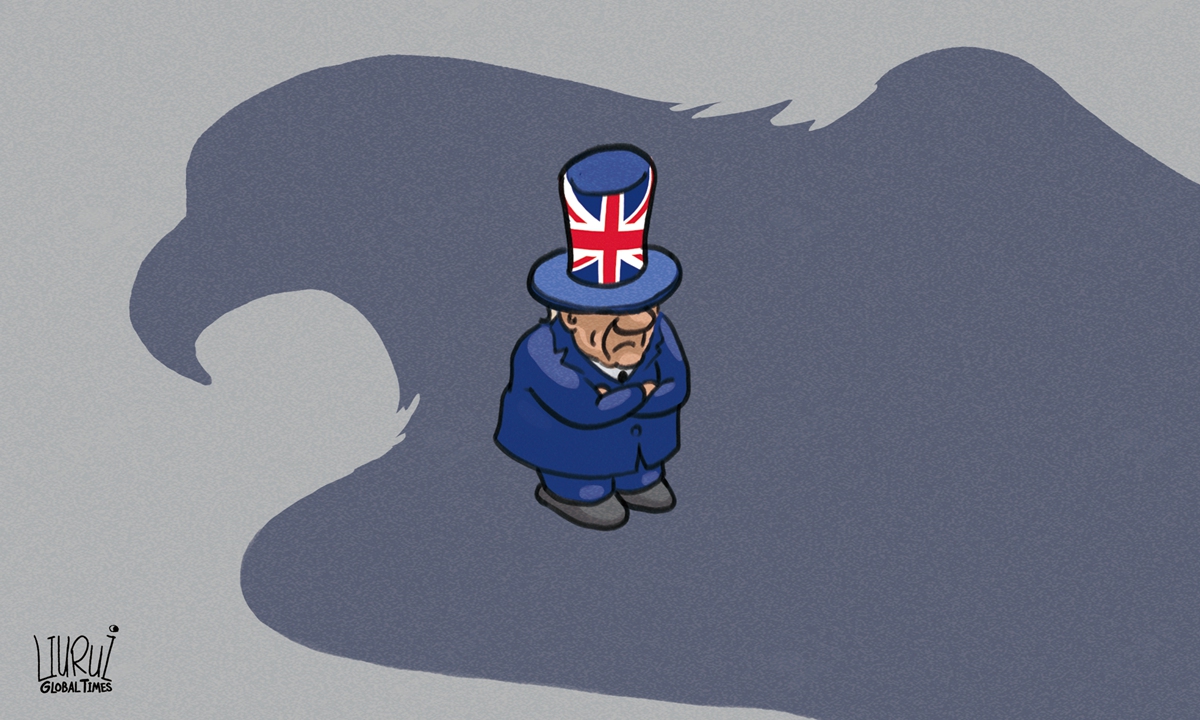It is not in the Great Britain's diplomatic interests to alienate China
By Gao Jian Source: Global Times Published: 2020/8/3 15:44:32

Graphics: Liu Rui
China-UK bilateral relations have been developing stably since 2015. Although it has been stuck in the Brexit dilemma over the past four years, the UK has nevertheless achieved steady progress in its cooperation with China in the fields of trade, economy, and education. However, some British China hawks are now demanding a "reset" of the China-UK relations at the expense of Britain's interests and business reputation. Such political claims will put the post-Brexit Britain in a very dangerous position.
The UK's recent change of attitude toward China has its own logic. Some perceive that the UK's firm opposition to Huawei's involvement in the British 5G network and the Hong Kong-related affair results from the US pressure. But they have neglected the basic characteristics of British domestic politics and its general rules of policy-making.
In fact, China and Britain hold fundamentally opposing views over Hong Kong. Mainstream British politicians still believe in the greatness of Great Britain from the colonial era and thus claim its "special interests" in Hong Kong. Many also still have a Cold War mentality and regard China as hosting an alien ideology. They are unwilling to accept the fact that China has thrived. Under the effects of such subtle attitudes, China-UK relations have both realized rapid developments and undergone constant trials.
Britain now is in the middle of its hardest period in modern history. Controversial as it is, Brexit has become a reality. This has put Britain in a terribly passive position. The question now is: Can the UK afford to lose China - an irreplaceable partner?
To answer this mildly: Nothing can replace such an important international partner.
Without positive bilateral relations with China, UK's strategic vision of "Global Britain" is nothing more than a vain slogan. The British government has put forward its diplomatic strategy: It needs to cope with the world's increasingly challenging political environment and make sure the UK will continue its successful participation in the global diplomatic practices.
This implicates a more international British diplomacy and a larger scale of mutually beneficial bilateral and multilateral relations, plus a firm attitude on free trade. However, what Britain has done against China has run against its strategy of "Global Britain." It has dwarfed the UK to an affiliate of US diplomacy. Where is "Global Britain" under such circumstances?
Excessive reliance on its old allies will only harm UK's fundamental interests. There is no evidence to show that a special relationship between UK and US will contribute to the UK's global diplomatic strategy. The Anglo-American bilateral relationship is essentially driven by interests. Therefore, it is merely a romantic notion for UK to expect America's concession in the free trade agreement by going against China.
It is worth pointing out that UK's policy against Huawei is tremendously harming its global image as a free trade country and further damaging its international business reputation. The vitality of the British economy depends largely on the free trade system. Hence, supporting worldwide free trade plays a core role in the UK's construction of "Global Britain."
Britain holds a fundamentally different vision from the US in terms of maintaining the global free trade system. It will uphold free trade principals in the upcoming WTO negotiations, for example.
However, its sudden change of policies on the Huawei issue has exposed its short-sighted attitudes. This has thus caused a loss of confidence with global investors in the British market. What kind of a free trade country would ever block regular commercial cooperation on the grounds of the so-called national security with no proof and harm the interests of its domestic consumers?
It is pure fact that there exists large room and huge demands in the China-UK relations. In a recent telephone conversation, Chinese State Councilor and Foreign Minister Wang Yi told British Foreign Secretary Dominic Raab that both sides should remain rational and mature, respect each other's core interests and major concerns, and maintain the political foundation of bilateral relations.
The British government has always put the maximization of practical interests as one of its founding principles. We therefore believe that a wise policy toward China can be expected.
The author is director of the Centre for British Studies, Shanghai International Studies University. opinion@globaltimes.com.cn
Posted in: VIEWPOINT,CHINA-EUROPE